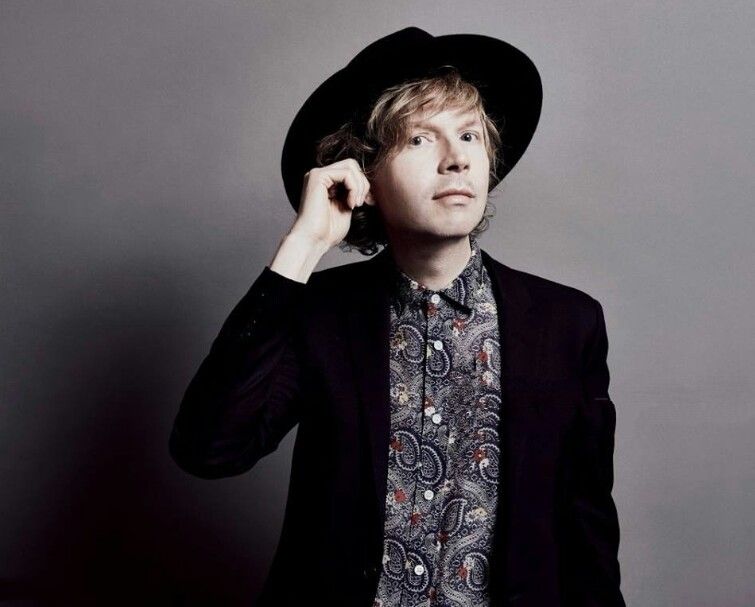Beck: 21st Century Masters

I can’t think of much to say about Beck in the ‘90s. The madcap folk-rap of 1994’s Mellow Gold excited a lot of people. Perhaps too much, but remember they'd just survived Vanilla Ice and Snow. His deluge of indie releases that year aren't mind-blowing, but let cool kids know he wasn’t Snow. Odelay was treasured by a world that now knew the value of smirky posers recording kaleidoscopic sophomore albums with the Dust Brothers. Gorgeously made with Radiohead producer Nigel Godrich, despite being meant for Bong Load rather than Geffen, Mutations impressed people who shirked from silly novelty, while the "real" Odelay follow-up Midnite Vultures impressed those who knew the value of silly novelty. I find the major albums fairly major (particularly Midnite Vultures, a manic, jam-packed tribute to pre-millennial multi-platinum Pop Life that naturally only went gold as Devil Without A Cause went Diamond), and consider the minor projects fairly minor. He probably didn’t deserve the “Gen-X Dylan” hype, but he certainly rewarded our attention.
Then again, he might be the only singer-songwriter in a wide-brimmed hat from Generation X who still gets to record whatever he wants whenever he wants with major label money, so Beck may be that market's Dylan by default. It’s also possible Beck’s third decade at the mic has been more worthwhile than Bob’s (yes, I’ll give the Nobel laureate the first and second decade trophies). After all, I have nothing Dylan did from 1981-1992. But I do have Colors.
Though Beck transcended the burden of his semi-ironic persona with 2002’s Sea Change, a moody break-up album recorded with Godrich, irony continues to haunt him in subtle ways. Sea Change was frequently more memorable for its swirling, dramatic arrangements than the singer or his songwriting. Modern Guilt, the seemingly slap-dash half-hour of guitar and loops he recorded with Danger Mouse to cap his Geffen contract, was unintentionally agonized over for months, ballooning past a planned length of 20 minutes. The Information was sold as the slight sequel to his alt-radio comeback Guero, but actually represented years of work predating it, culled from botched attempts to record a “hip-hop” album with Godrich. When he decided to make a sunny, snoozy “happily married with children” sequel to Sea Change, named Morning Phase, it featured all involved except Godrich. Meanwhile, his first album after filing for divorce was his goofiest since Midnite Vultures, all vaporwave tributes and Pharrell Williams collaborations as earnestly batty as you’d imagine. Morning Phase, the slightest of these albums, won him a Best Album Grammy at Beyonce’s expense. The clown who made his name with "drive-by bodypierce!" was finally called out for cultural co-option when he'd never been trying less. Isn’t it ironic?
True, Colors - producer Greg Kurstin encouraging Beck to revel in his post-Grammy Q-rating uptick and dream of pop relevance again (warning: if you cringed at the fortysomethings clogging the radio in 1989, this one isn’t for you) - is the only of these albums I find satisfying enough to own. But I’ve found songs to enjoy on all of them. Beck’s voice, warm and non-threatening even as he shouts "Lamborghini shit-zu," is always recognizable despite the left turns, and revisiting his work is always rewarded by new discoveries in the arrangements, layered even when not flamboyantly grab-bag. Maybe it’s appropriate for the “Dylan” of Generation X - once determined to distinguish itself, now a small segment of the olds missing the 20th century - to stand out mostly in the studio, his charisma a boyish mix of audacity and diffidence, while never really supplanting what came before him, taking trophies for looking the part.
This CD-length 21st Century Masters playlist is an attempt to make his minor major case. Three songs from my favorite album of the period, two songs each from the ones I'm almost down for, and a pair from the pair I find most frustrating (plus a Korgis cover from Eternal Sunshine Of The Spotless Mind). There’s other great tracks to be found, but I wouldn’t say you need to spend money finding them. My moral calculus for compiling without my usual "buy albums" tag? He’s regularly quoted about wishing to abandon the past paradigms of the industry, and the guy did a Neil Young cover for the NFL. His wallet and my karma can handle it.
- “Colors” (Colors, 2017)
- "I Think I’m In Love” (The Information, 2006)
- "Heart Is A Drum” (Morning Phase, 2014)
- “Uneventful Days” (Hyperspace, 2019)
- “Lost Cause” (Sea Change, 2002)
- “Walls” (Modern Guilt, 2008)
- “Wow” (Colors, 2017)
- “Black Tamborine” (Guero, 2005)
- “Round The Bend” (Sea Change, 2002)
- “Profanity Prayers” (Modern Guilt, 2008)
- “Dreams” (Colors, 2017)
- “Go It Alone” (Guero, 2005)
- “Everybody’s Gotta Learn Sometime” (Eternal Sunshine Of The Spotless Mind soundtrack, 2004)
- “Star” (Hyperspace, 2019)
(Midnight Vultures is at 233 on My Top 300 Favorite Albums of All Time. I'm telling you this because I've found people are more inclined to discuss and share reviews if there's a quantitative element at the top or bottom they can easily debate. Prove me right!)